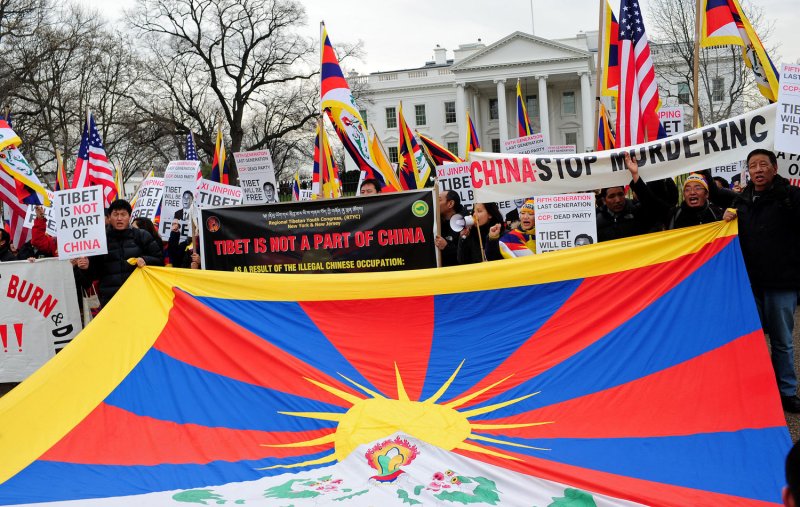1 of 2 | Tibet Supporters protest the visit of Chinese Vice President Xi Jinping outside the White House in Washington on February 14, 2012. UPI/Kevin Dietsch |
License Photo
BEIJING, March 2 (UPI) -- Top Chinese leaders, ahead of the annual National People's Congress, have stressed the need for social progress in Tibet but warned separatist groups off protesting.
The ruling Communist Party should "should consider both internal and external situations" and follow the path of "making progress while maintaining stability," Jia Qinglin, a member of the Standing Committee of the Political Bureau of the Central Committee of the Communist Party of China, said.
Jia urged officials in Tibet and Tibetan-inhabited areas of the neighboring provinces of Sichuan, Yunnan, Gansu and Qinghai to maintain steady growth, a report by government run news agency Xinhua said.
Efforts should be made to improve the livelihoods of local farmers and herders, including better access to public services, housing, education, healthcare, employment and social security.
Jia made the remarks while presiding over a meeting to promote development and stability in the areas.
Next week China's National People's Congress will meet in Beijing, ahead of the anniversary of the March 2008 riots in the Tibetan capital Lhasa.
The Communist Party, national police and local police authorities and the military will be alert to protests and street demonstrations in Tibet and surrounding provinces.
Jia warned against what Beijing sees as encouragement of separatist groups by the self-exiled Dalai Lama spiritual Buddhist leader.
"The clique of the Dalai Lama (is) trying in vain to continuously create incidents in Tibet and the Tibetan-inhabited areas in the four provinces," Jia said.
Beijing consistently has fought against what it says is the Dalai Lama's interference in Tibetan affairs since he fled soon after the Chinese army marched into Tibet in the late 1950s.
In particular, Beijing says the Dalai Lama urges terrorist acts against Chinese people and institutions in Tibet, as well as encourages acts of self-immolation, an increasingly used form of protest.
Even though the Dalai Lama always has rejected Beijing's accusations, senior Chinese officials including Jia go out of their way to warn Tibetans against supporting the Dalai Lama.
"(Authorities) should implement the prescribed measures well to resolutely crush the Dalai Lama clique's conspiracy of making Tibetan-inhabited areas unstable, thus making the masses able to live and work there comfortably," Jia said.
He said local officials and Communist Party cadres should visit local people to better understand their needs so they support the government.
Officials also should cultivate relationships with "with religious figures who love the country," he said.
Many Tibetans resent what they see as a ploy by Beijing to move ethnic Han Chinese into the majority Tibetan areas, making Tibetans a minority in their own lands.
Jia's comments were backed up by tougher warnings from Tibet's Communist Party Secretary Chen Quanguo.
He urged officials in Tibet to maintain monitor mobile phone and the Internet use and all leave is canceled for the time being, a report by the BBC said.
Officials should work "to crush plots aiming to sabotage stability in Tibet and threaten security of the state by hostile forces and the Dalai Lama group," Chen is quoted as writing in the official government Tibetan Daily newspaper.
"Mobile phones, the Internet and other measures for the management of new media need to be fully implemented to maintain the public's interests and national security," Chen said.
Chinese authorities have been worried about acts of self-immolations in Tibetan areas, mainly by monks and nuns -- some filmed by people using mobile phones and then posting the videos on the Internet.
Chen said monastery management officials should intensify their political work. They must guide Tibetan Buddhist monks and nuns "to be patriotic, love their religion and respect law and order," his Tibet Daily article said.





